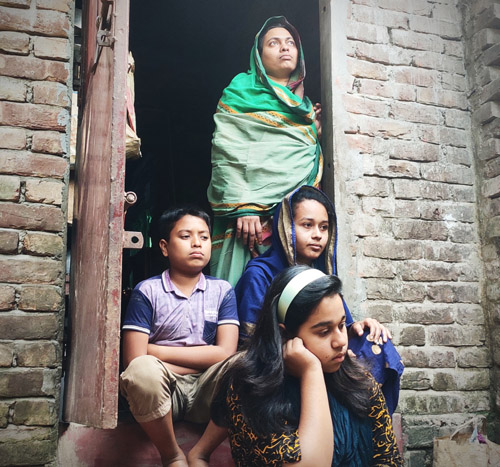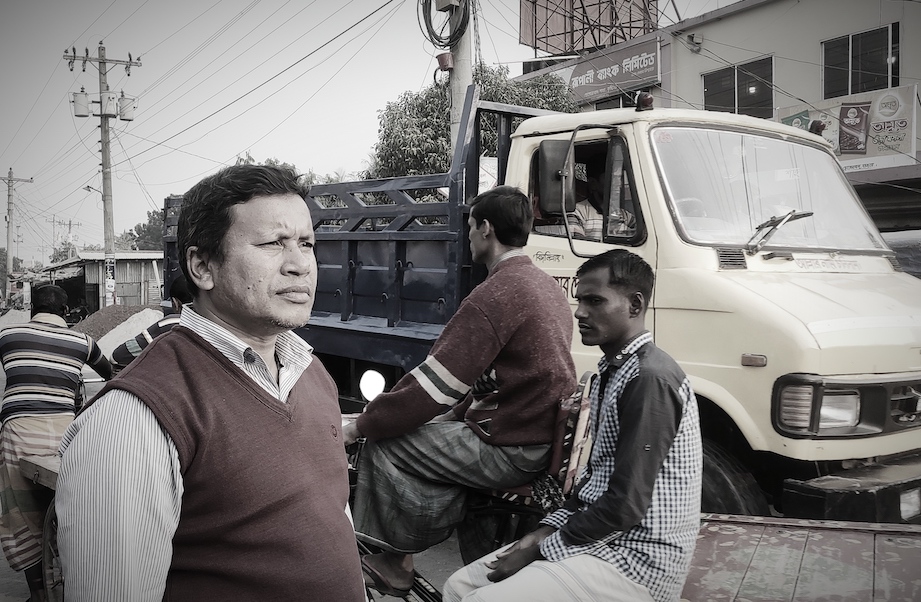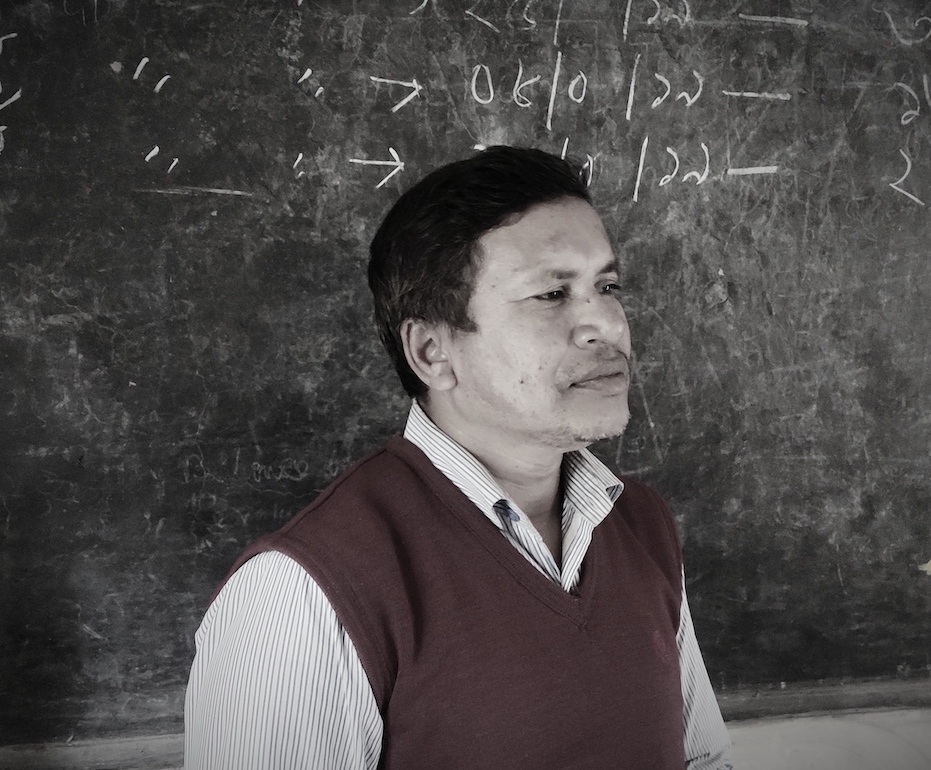Tale of a Teacher
About 25 years ago, there was a high school teacher, Abdur Rahim. He was from a family of five - himself, his wife, two daughters and a son. One of the girls went to college and the boy went to primary school.
Abdur Rahim left his village to live in a rented house in the city so he could send his children to good schools and colleges. Because high school teachers only get paid after two or three months has passed, he had to offer private tuition* at that time, so he could somehow look after his family. Month after month he had to wait for his salary. Life was very hard. How do I know this dear readers? You are right. Abdur Rahim is my father.
One day he went to the bank to collect his salary. It was about 25 kilometres away. My sisters and I sat outside on the footpath* all day. We had been there since morning. “When will father come?”, we asked each other. “Today father will get his salary. Surely he will bring us some good food. Tomorrow we can take two taka* to school for tiffin*. How happy we will be to eat well.” And so, in this way, we spoke to each other. We spent the day weaving the net of our imagination. Morning became afternoon, and afternoon turned to evening. Still father did not come.
Mother became very worried about my father. Where had he gone? What had happened? Those were the days when there were no mobile* phones. At that late time, it seemed like the darkest deepest night. At 10 o'clock, mother was still standing in front of the door waiting for our father and saying the Dua Durood*.

We couldn't sleep because we could see that mother was very worried. Everyone sat so quietly without saying a word. I was in class six then, so as you can see, I was much younger at that time. Even though 12 o'clock came, I still could not go to sleep. I was so worried about my father. My older sister tried to comfort me by smoothing the hair on my head, but still I could not sleep.
At last father appeared at the door. We all jumped up when we heard his voice. Father's face looked very sad. Speaking in a very low voice, Mother asked angrily, “Where have you been all day?” But father said nothing at all. He remained completely silent.
We also asked him, “Where have you been? Why are you so late?” Again, mother spoke. “We have been waiting for you all day. You promised to bring home good food from the market today, but you are empty-handed! Now it is so late, you will have to go shopping tomorrow morning.” She sounded very angry.
Father still said nothing, and his eyes began to fill with tears. My older sister also began to cry when she saw my father crying. Father continued to cry and said, “I was coming home by bus after getting my salary from the bank. Someone picked my pocket and all the salary money has gone!
He explained that when he got off the bus he realised that he no longer had any money in his pocket. He ran around looking everywhere for the pickpocket* and he lost his way. In the end, he went back again to the same place where he had got on the bus, but at last, he had to return home empty-handed.

At that time, I was so little, I did not fully understand the pain of my father's tears. I did not understand the pain of losing the money that our family needed. Father’s tears that day were just for us. He had waited for a long time to get his salary so he could feed us with good food and fill us up a bit. That money was also to buy our clothes. Father never looked at the state of his own clothes. His shoes were so old, there was nothing left of them to repair.
For five years before the end of his working life, my father studied and completed a B.Ed*. to try to get a higher salary. Even then he could not reach a higher salary scale. The school headmaster and the managing committee of the school would not help him, even though my father had an MPO* registered position! Instead, they told him, showing him various rules that they said they had to follow, saying that he had to take a new appointment in a school for agricultural education, even though my father was a science teacher.
They hired him to do different things, and in this way took the money from my father that he should have earned. My father was helpless, and in the end, he had to take a loan from some NGOs* and take another appointment in the same school with that money. The fact was, if he had been given a higher salary scale, he would have received double the amount of retirement money at the end of his working life, so thinking this, he borrowed money and gave it to them, hoping it would help him get a higher position. However, even after his new appointment, he could not change the scale he had received from the MPO authority, and many other unhappy things happened. A year and a half passed after that, but still my father didn't get paid on a higher scale.
My father retired in August 2012 without ever reaching the higher scale he had hoped for. Even though my father was the founding teacher of his school, the school did not even hold a farewell* ceremony for him when he retired. His dream of hanging a farewell certificate* on the wall at home has not been realised, even today! What a sad ending to the career of such a hard-working teacher.

In spite of my father’s hard life, I also chose my father's profession. My father did not want me to become a teacher, because he did not want me to suffer the way he had suffered. Being a teacher may not be the most well-paid kind of work to do, but making a difference in the lives of young people is important to me, so teaching is, for me, one of the most satisfying professions of all.
________________________________________________
Learning Activities
Vocabulary
-
Words from the second 1000 high frequency General Service Word List
| afternoon | comfort | manage / managing | retired / retirement |
| agricultural | double | net | sad |
| angrily / angry | earned | pain | salary |
| (a litle) bit | education | phone(s) | scale |
| borrowed | empty | picked | shoes |
| bus | hired | shopping | |
| ceremony | imagination | profession | smooth / smoothing |
| clock | jumped | quietly | tomorrow |
| clothes | kilometres | rented | weaving |
| collect | loan | repair | worried |
2. Words from the Academic Word List
authority founding primary registered
3. Glossary
Certificate (Noun) = An official document showing someone’s achievement.
Dua Durood (Arabic noun phrase) = Islamic prayer of request
Farewell = (Noun) a time when one says goodbye to another. (Verb) the act of saying goodbye to someone.
Footpath (Noun = paved place where people walk beside the road
Headmaster (Noun) = the principal teacher of a school (male). Headmistress (female)
Mobile (Noun) = can be moved or carried
Pickpocket (Noun) = a person who steals something from someone’s clothing (pocket) or bag, often this is done in a crowded public place
Taka (Noun) = Bangladeshi money
Tiffin (Noun) = snack or light meal
Tuition (Noun) = private teaching
_____
B.Ed. (Acronym) = Bachelor of Education degree
MPO (Acronym) = Monthly Pay Order, a scheme for payment of teacher’s salaries
NGO (Acronym) = Non Governmental Organisation
Comprehension Questions
-
Remembering: Why didn’t Abdur Rahim contact his family before he returned home, to tell them what had happened?
-
Remembering: Why does the author say that teaching is a satisfying kind of work?
-
Understanding: Why did the children sit so quietly while they were waiting for their father to return?
-
Understanding: Why was the fact that Abdur Rahim was a registered MPO teacher so important?
Critical Thinking Questions
-
Analysing: Even though Abdur Rahim was a science teacher, he was made to teach in an agricultural college. In what ways would the two jobs be similar? In what ways might they be different? How do you think Abdur Rahim felt about being made to change schools and the type of teaching he had do, and why? Explain in English.
-
Applying: If you suddenly lost a lot of money, what would you do? What is the best way to keep your money safe when you are using public transport or if you are in a crowded place? Explain your ideas in English.
-
Applying: List three problems Abdur Rahim experienced, as described in the story. What would have been the best way to solve each of these problems? Explain your ideas in English (Either in writing or by speaking about them.)
-
Evaluating: Why do you think the Headmaster and the Managing Committee of the school did not help Abdur Rahim? Why do you think Abdur Rahim continued to work as a teacher, even though he had so many difficulties? Give reasons, in English, to explain your answer.
-
Evaluating: In your view, what is the best kind of work to do and why? Is it more important to do work you love or to do work that pays well? Give a reason for your answer.
-
Creating: Imagine the conversations that took place in the story. With a partner, create and write down one of the following dialogues in English...
1. The conversation that Abdur Rahim had with someone in the city when he realised his money had been stolen and he was lost
2. The conversation the children and their mother had while they were waiting for Abdur Rahim to come home
3. The conversation Abdur Rahim had with his wife when he got home
4. The conversation Abdur Rahim had with the Headmaster of his school
Now practice your dialogue. Try to remember your lines by heart.
Act out your dialogue for your classmates.
As you watch each performance, give a score using the following...
|
Names of actors
|
1 = weak | 2 = good | 3 = excellent |
| Interesting dialogue | |||
| Easy to understand | |||
| Realistic acting | |||
| Total Score out of 9 | ------------------- | ------------------- | ________/9 |